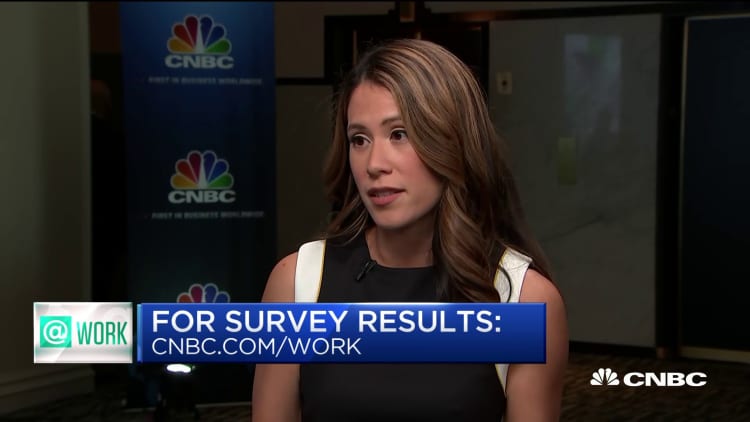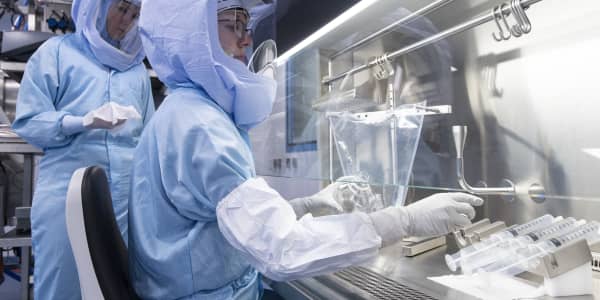As unions, corporations and governments debate what effect artificial intelligence, machine learning and automation will have on the future of the workforce, venture capital investors are identifying the most interesting start-up investments that may help steer this historic paradigm shift.
Among them is Microsoft's M12 venture fund and Dell Technologies Capital. Both aim to advance human progress and focus on start-ups they can mentor with their companies' own technical expertise and market know-how.
"Our goal is to get a window on innovation," says Scott Darling, president of Dell Technologies Capital, who notes that Michael Dell reviews every single deal the fund invests in. "We need to plug into the external entrepreneurial ecosystem. This is so important, since the pace of technology is stunning."
As Darling explains, the ROI on successful start-ups is so large that the dollars flowing into these ventures by investors has boomed. That's because the market for these technology products is typically huge. In Dell Technologies' case it has invested more than $600 million in about 100 investments over the last six years. Of these, there have been 40 exits and five IPOs, with a combined market value of over $50 billion, including Docusign, Cylance, MongoDB and Zscaler.
More from At Work:
Perhaps money can buy you happiness — at least at work
A third of US workers seriously considered quitting their job in the last 3 months. Here's why
Nagraj Kashyap, corporate vice president and global head of Microsoft's M12, a venture fund focusing on enterprise software, AI, cybersecurity and cloud computing, agrees. "Innovation isn't limited to our corporate boundaries. It is an exciting time to see how AI is transforming the workplace. Already we see it becoming more distributed, more flexible and diverse."
The success quotient for these corporate funds and the companies they invest in has been high for a key reason. Dell and Microsoft invest in companies they can help make commercially viable and often plug them into their product development, sales and distribution networks. This helps start-ups gain product adoption— and a first-mover advantage.
For example, Microsoft has partnered with corporate education start-up GO1.com after its venture arm, M12, led a Series B round investment of $30 million last June. The Australian start-up that emerged from the Y Combinator accelerator is the Netflix of training. GO1.com offers a SaaS subscription service that plugs into any software platform, allowing HR departments to tap 50,000 training courses — everything from compliance and leadership training to IT skills — in multiple languages for their workforces.
GO1.com is growing its service 300% annually, according to co-founder and chief operating officer Chris Eigeland. Its product has been integrated into the Microsoft Teams chat software, along with Microsoft Dynamics 365 enterprise resource planning and CRM software. This has helped the four-year-old start-up garner 1.5 million learners and more than 1,500 customers worldwide.
"The biggest challenge employers face today is in reskilling and finding the right piece of training to suit their particular needs," says Eigeland. "Advances in technology, a more transient workforce and a focus on specialization by profession are the trends we are seeing."
Coping with change at warp speed
Matthew Carroll, CEO of Immuta, a data governance start-up in Maryland that attracted funding from Dell Technologies in its $20 million Series B financing last year, also believes that employees are being swept up in a whirlwind of change. The company that is run by former U.S. National Security Agency techies has developed a method to govern how data is used by machine-learning algorithms without breaching privacy laws.
"Very soon in the future, I believe every employee will have automation tools and they will be data analysts doing their jobs every day," he says. Right now the speed at which companies are adopting AI, machine learning and data analytics is posing a serious risk.
"Companies need to ensure data is being used appropriately and privacy is being respected without breaking any government regulations," he says. "Machine learning is booming, and we still don't know the long-term consequences of it yet."
The companies that do this best will be able to attract the best talent. "Millennials are going to want to work for employers that use data responsibly. This will be a big issue for employees," says Carroll, who contends that as a former intelligence operative, he looks at the world through a safety lens.
"We think of our product as a control layer that determines who [man or machine] should see or use company data," he says. Immuta's SaaS enterprise platform connects to any data source in the cloud or on premises through any tool so data scientists don't have to write code or copy the data. It lets legal teams build rules and controls onto the data so they maintain regulatory compliance.
Carroll sees a $30 billion market for automating data governance as machine learning goes mainstream in corporate America. According to Gartner, global business value derived from AI will reach a staggering $3.9 trillion by 2022. Yet legacy forms of data management for AI are counterproductive and not advanced enough.
That is why Dell is looking at potentially licensing the software and then bundling it with its own product offerings to sell to OEMs.
The A.I. boom sweeping the industry
Using AI to empower an organization and boost efficiency is another area that start-up's like Noodle.ai are targeting. The San Francisco-based start-up provides AI-as-a-service, explains Noodle.ai CEO Stephen Pratt. The company, which attracted $35 million in a venture capital round led by Dell Technologies Capital and TPG Growth last year, builds a customized in-house platform for clients called the Beast, which serves as the Office 365 of AI applications for general business purposes. It improves inventory and energy management, manufacturing and the supply chain.
Noodle.ai engineers and data scientists build three-component machine-learning systems that consist of a sensory engine that finds patterns in data, a prediction engine that calculates what's likely to happen in a business, and a recommendation engine that surfaces actions to meet objectives. Results selected from the recommendation engine are fed back into the system, starting the cycle over.

The start-up's clients include XoJet, one of the world's largest private aviation platforms; and American steel producer Big River Steel. In XoJet's case, Noodle.ai produced a learning algorithm that takes into account thousands of variables to determine the right prices for airfare, which boosted the company's profitability by 5%. And for Big River Steel in Arkansas, it used more than 30,000 sensors and AI to predict how much electricity would be consumed by the mill's machines so it could sell excess energy back to the electric company.
AI will dramatically change the workplace over the next 5 to 10 years. It is those companies keeping on top of the pace of innovation that will thrive.Nagraj Kashyapcorporate vice president and global head of M12,
"Empowering companies to be radically more efficient and supercompetitive is what we do," Pratt says.
That is important for any size company but becoming harder as the talent crunch worsens — especially in emerging fields like AI and automation.
Recognizing the shortage of data science professionals, M12 invested — and Microsoft later acquired — Bonsai, a start-up that helps engineers, even those without AI expertise, build their own artificial intelligence models and incorporate AI into their business. Using what Microsoft calls a machine-teaching approach, it "abstracts … low-level mechanics" to enable engineers to specify and train autonomous systems to accomplish tasks in a virtual environment.
The huge market potential led Microsoft to integrate Bonsai's technology into its own AI development toolset last year. It is now part of its autonomous systems group.
"This technology is important, since so many companies are adopting AI and need to teach these systems," says Mark Hammond, co-founder of Bonsai who is now general manager of business AI at Microsoft.
"It allows companies to develop their AI capabilities without having to hire AI engineers as market demand grows," says M12's Kashyap.
Customers piloting the product now include Schneider Electric, Shell and Toyota.
As Kashyap points out: "AI will dramatically change the workplace over the next 5 to 10 years. It is those companies keeping on top of the pace of innovation that will thrive."
For more on tech, transformation and the future of work, join CNBC at the @ Work: People + Machines Summit in San Francisco on November 4. Leaders from Dropbox, Sas, McKinsey and more will teach us how to balance the needs of today with the possibilities of tomorrow, and the winning strategies to compete.
Correction: This story has been updated to reflect that Dell Technologies has invested more than $600 million in about 100 investments over the last six years.





